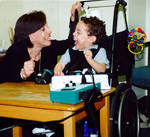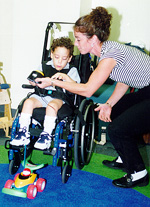Youngster yearns for learning, adapting
by Cindy AbolePublic Relations
His heart and his mind are as playful as any loving 3-year-old, but Julian Villicana’s body won’t cooperate. Julian has cerebral palsy; and his life is bound to a wheelchair.
 Speech-language
Pathologist Gilson Capilouto shares a spirited moment with 3-year-old patient
Julian Villicana. Here, she acquaints Julian with a switch-activated timer
device allowing him to blow bubbles.
Speech-language
Pathologist Gilson Capilouto shares a spirited moment with 3-year-old patient
Julian Villicana. Here, she acquaints Julian with a switch-activated timer
device allowing him to blow bubbles.
Julian was born prematurely in June 1996 and suffered from bleeding of the brain, which resulted in cerebral palsy. Cerebral palsy affects the body’s motor function, muscle control and coordination.
Lately, Julian has shown some progress in learning to manage life skills, play activities and communication with others. This 1998 March of Dimes Ambassador has received the support and confidence of care givers, family and the benefits of new technology to live his life.
Managing cerebral palsy is a challenge at any age. Therapy is often required for a young child to meet mobility, communication and other daily living goals. Educational and emotional development are priorities for the growing child. In the adult years, they may require help with transportation, assisted living and vocational training.
Julian received speech therapy through St. Francis Home Health speech-language pathologist Myra Howard. Over time, Howard noticed his response and steady progress. She referred Julian to MUSC’s Assistive Technology Lab, an innovative center that provides statewide support to rehabilitation professionals, educators parents and families. The lab is operated by the Department of Physical Medicine and Rehabilitation in the College of Medicine.
Julian's mother, Renee Villicana, learned about the lab through MUSC’s Caring Connection, a program geared for parents who have children with disabilities. Villicana met other parents who shared similar struggles and challenges in raising a disabled child.
Julian was introduced to Gilson Capilouto, project director and seminar leader for the assistive technology team and rehabilitative sciences instructor for the College of Health Professions.
“Our goal was to provide a process to identify ways to help Julian become dependent in controlling his environment and communicating,” Capilouto said. “Because of Julian’s condition, he can’t play independently or communicate in all the typical ways children his age generally do.”
 Assistive
Technology Lab director Cheri Gardner shows Julian how to operate a switch-adapted
remote control race car.
Assistive
Technology Lab director Cheri Gardner shows Julian how to operate a switch-adapted
remote control race car.
In infants, cerebral palsy is caused by a lack of oxygen reaching a fetal or newborn’s brain. Within the United States, it’s estimated that more than 500,000 children and adults have one or more symptoms of this disease. About 5,000 babies and infants are diagnosed with the condition annually. Each year, some 1,200 to 1,500 preschool-age children are recognized to have cerebral palsy.
Capilouto has worked closely with Julian, his mother, therapists and colleague Cheri Gardner, lab director, in order to identify potential aids and devices that will facilitate Julian’s abilities to play, talk and learn.
“Assistive technology provides patients like Julian with a potential means for accomplishing many tasks,” Capilouto said. “For example, we can help him play more independently by giving him access to toys and activities adapted to meet his needs. For example, Julian loves music and is responsive to the sounds of the Gypsy Kings or Spanish salsa guitar using a switch-motivated timer device. He is very interactive and responds well to praise.”
In addition to recreational devices, the lab has provided initial recommendations for adapting computer activities for Julian. Like any youngster his age, Julian is fascinated by the chance to bang on a keyboard and learn to use a mouse. Julian is using the computer to learn his alphabet, colors and numbers like many of his peers. He is also actively involved in using a variety of simple devices designed to help him communicate and reduce his frustration.
“I’ve made it a habit not to expect the best of things when it comes
to dealing with Julian’s disability,” said Villicana. “I’ve learned to
take what I can get and so far, it’s made me so happy.”
Program pitches technology, teaching
by Cindy AbolePublic Relations
Imagine being the parent of a child with cerebral palsy, muscular dystrophy or any other handicapping condition.
Then, imagine one resource that houses information and ideas, trains professionals and helps patients gain experience using a variety of assistive devices without ever leaving the Palmetto State. These are just some of the services available through MUSC’s Assistive Technology Lab. And those services have lifted the hopes of dozens of children and adult patients since 1994.
“We have a program whose dynamics are unique to South Carolina and the Southeast,” said Jim Warmoth, M.D., professor and chairman of MUSC’s Department of Physical Medicine and Rehabilitation. “Our lab is not part of an isolated program. It provides opportunities for a lot of hands-on activity combined with an academic environment and hospital setting. That’s what’s important for our patients.”
The lab supports educators, parents, speech language pathologists, physical and occupational therapists who assist patients diagnosed with congenital conditions such as cerebral palsy and other developmental delays. It’s also equipped to provide resources for patients who have acquired disabilities such as stroke, spinal cord injuries, multiple sclerosis and individuals with amyotrophic lateral dystrophy, commonly known as Lou Gehrig’s disease.
“Each successive generation is becoming more dependent on technology,” said Cheri Gardner, director of MUSC’s Assistive Technology Lab. “We’re targeting our program to support educators, social workers, therapists or parents who want to know more about the benefits of assistive technology. We help them identify equipment that facilitates a person’s ability to carry on their daily activities.”
The program, now in its fifth year, is supported by a grant from BabyNet, a federally funded program administered by the S.C. Department of Health and Environmental Control (DHEC). BabyNet supports infants and toddlers with disabilities by providing early intervention services, physical, occupational and speech-language pathology services. To date, BabyNet has awarded more than $750,000 in funding to support assistive technology lab programs. This summer, the lab received an additional $50,000 in funding from the University of South Carolina’s Department of Pediatrics to purchase technology targeted at teens and adults.
Speech-language pathologist and labs project director Gilson Capilouto also uses the lab as a training ground for South Carolina’s future therapists teaching them the benefits of technology for people with disabilities. Capilouto serves as course coordinator for a graduate class in assistive technology taught to students enrolled in the College of Health Professions, Department of Rehabiliation Sciences. She is able to maintain and manage a secure website that supports course learning objectives for these interdisciplinary students. Technology students can access course information from the Internet, obtain assignments, readings and exams.
Together, Gardner and Capilouto provide professional training and resource support to students and professionals throughout South Carolina, Georgia and North Carolina.
“On an engineering level, it’s my goal to identify and adapt the tools,” said Gardner, who is a biomedical engineer. “Success is achieved when a patient learns how to control a tool he or she needs. It’s my job to provide that systematic approach.”
As part of their approach, Gardner and Capilouto work with a team of individuals concerned with the success of their mutual patients. Recommendations for equipment are evaluated periodically to make sure they meet the patient’s ongoing needs. The assistive technology team operates on a systematic approach and can provide additional support to therapists within a school environment or other settings.
In 1996, Capilouto expanded the program to include MUSC’s satellite campus at University Center in Greenville. The lab is a scaled-down version of Charleston’s main site, featuring access to four computers terminals and enough classroom space to accommodate its 25 students. Lectures are accompanied by hands-on activities in the lab with regular visits by Gardner or Capilouto.
“The course is one of several core requirements for physical, occupational and speech therapy seniors,” said Robbie Leonard, assistant professor and program director for the Greenville Physical Therapy Program. “The lab activities are conducted in real-time involving both lecture and lab time.”
The program hopes to provide more software and equipment for older patients. “In therapeutic services, its our goal to improve an individual’s abilities and set challenges over time,” said Gardner. “As abilities change, we want skills to improve. Our ultimate goal is to provide clients with a range of functional independence within their life environment.”